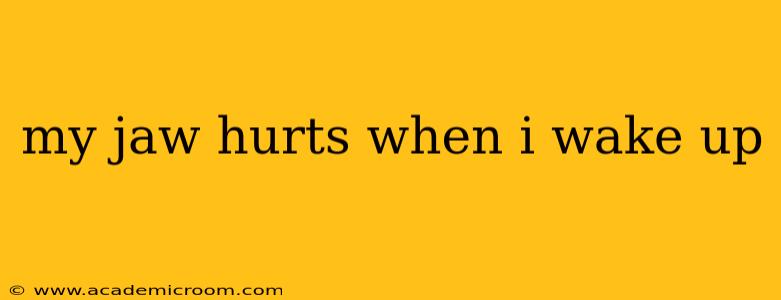Waking up with jaw pain can be incredibly frustrating and disruptive. This discomfort, often manifesting as stiffness, soreness, or even sharp pain, can significantly impact your daily life. Understanding the potential causes is the first step towards finding relief. This comprehensive guide explores various reasons why your jaw might hurt when you wake up, along with effective solutions to manage and alleviate the pain.
What Causes Jaw Pain When I Wake Up?
Several factors can contribute to jaw pain upon waking. Let's delve into some of the most common culprits:
1. Temporomandibular Joint (TMJ) Disorders:
This is arguably the most frequent cause of morning jaw pain. The temporomandibular joint (TMJ) connects your jawbone to your skull, and dysfunction in this area can lead to a range of symptoms, including pain, clicking, popping, and limited jaw movement. TMJ disorders can stem from various factors, including stress, teeth grinding (bruxism), arthritis, and injuries to the jaw. The prolonged pressure and strain during sleep often exacerbate these issues, leading to noticeable pain upon waking.
2. Teeth Grinding (Bruxism):
Bruxism, the unconscious clenching or grinding of teeth, is a significant contributor to morning jaw pain. This often occurs during sleep, putting immense pressure on the jaw muscles and TMJ, resulting in soreness and stiffness when you wake up. Stress, anxiety, and even certain medications can trigger bruxism.
3. Sleep Position:
Your sleep posture plays a surprising role. Sleeping face down or with your head turned at an awkward angle can strain your neck and jaw muscles, causing pain upon waking. This is especially true if you already have underlying TMJ issues or neck problems.
4. Arthritis:
Osteoarthritis or rheumatoid arthritis affecting the TMJ can lead to chronic jaw pain, often more pronounced in the morning due to stiffness and inflammation. The pain may be accompanied by swelling and limited jaw mobility.
5. Stress and Anxiety:
Psychological stress and anxiety can manifest physically, often through muscle tension, including in the jaw muscles. This tension can build up throughout the day and intensify during sleep, leading to morning jaw pain.
What Should I Do If My Jaw Hurts When I Wake Up?
Addressing morning jaw pain requires a multi-faceted approach:
How Can I Prevent Jaw Pain While Sleeping?
- Identify and manage stress: Practice relaxation techniques like yoga, meditation, or deep breathing exercises to reduce stress levels.
- Improve sleep posture: Try sleeping on your back with a supportive pillow that keeps your head and neck aligned. Avoid sleeping on your stomach or side with your head turned sharply.
- Consider a mouthguard: If you suspect bruxism, a custom-fitted mouthguard from your dentist can protect your teeth and reduce jaw strain during sleep.
- Apply heat or cold: A warm compress can help relax tense jaw muscles, while a cold compress might reduce inflammation. Experiment to see what works best for you.
What Home Remedies Can Help With Jaw Pain?
- Over-the-counter pain relievers: Nonsteroidal anti-inflammatory drugs (NSAIDs) like ibuprofen or naproxen can help reduce pain and inflammation. Always follow the recommended dosage.
- Gentle jaw exercises: Your dentist or physical therapist can guide you on specific exercises to improve jaw mobility and strengthen muscles.
- Soft foods: Opt for soft foods that require minimal chewing to reduce strain on your jaw.
When Should I See a Doctor or Dentist?
Persistent or severe jaw pain, accompanied by other symptoms like headaches, earaches, or difficulty opening your mouth, warrants a visit to your doctor or dentist. They can accurately diagnose the underlying cause and recommend appropriate treatment, which may involve medication, physical therapy, or even surgery in some cases.
Frequently Asked Questions (FAQs):
Can a bad pillow cause jaw pain?
Yes, an unsuitable pillow that doesn't support your head and neck properly can lead to misalignment, straining your jaw muscles and causing pain.
Why does my jaw pop when I wake up?
Jaw popping can be a symptom of TMJ disorders. The popping sound is often caused by the misalignment or displacement of the articular disc within the TMJ.
Is jaw pain a sign of something serious?
While often stemming from relatively benign causes like bruxism or poor sleep posture, persistent or severe jaw pain should be evaluated by a healthcare professional to rule out more serious underlying conditions.
How long does it take for jaw pain to go away?
The duration of jaw pain depends on the underlying cause and the chosen treatment approach. Minor cases might resolve within a few days, while others may require more extensive treatment and take longer to heal.
Remember, this information is for general knowledge and does not substitute professional medical advice. If you experience persistent or severe jaw pain, consult a healthcare professional for proper diagnosis and treatment.
